Yo Ho and be merry on the Dong Chun Ferry
The adventure ends in Korea when Elephant gets packed in a crate to be shipped home.24 July to 4 August 2008
We had an easy week in Vladivostok working out our next move, eating well and catching up with other travelers. It didn't take us long to work out that shipping a bike out of Russia was going to be hard work and that our best bet for a successful departure would be for Team Elephant to all go out together. We decided to catch the Dong Chun Ferry from Zarubino to Sokcho, Korea, on Monday 21 Jul.
With a good night's sleep under our belts we started early on the 260 km run to the port. Of course it rained and the road turned to mud but we found the ferry-less port by 1130. It was too early to buy a ticket; come back at three said the lady at the gate. We dripped all over a cafe floor for a few hours and went back at three. The port was still ferry-less and it was still raining. No ferry today, said the lady, come back tomorrow at 1000.
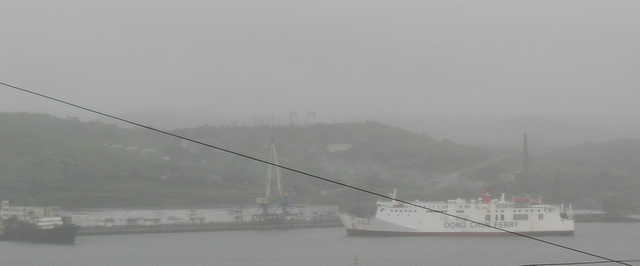
Zarubino, the ferry and the rain.
After a long hard search we found the only hotel in town, hidden at the back of some crusty old apartment buildings up a dirt road turned to a river. By the time we got inside we were wet through and cold and the rain continued to thunder down. As always, some food and a warm bed improved morale.
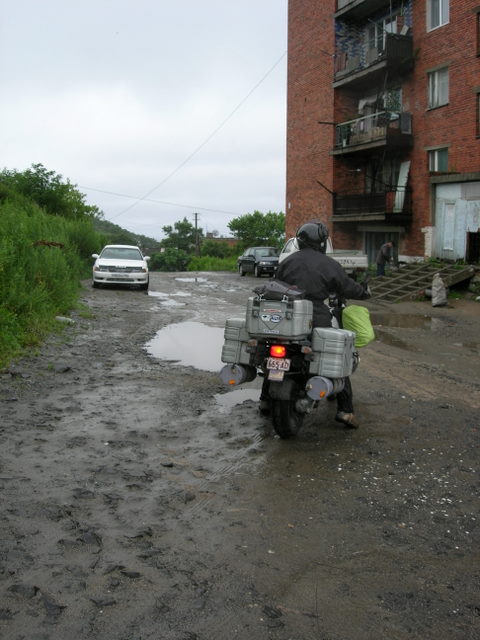
There is a hotel up here somewhere!
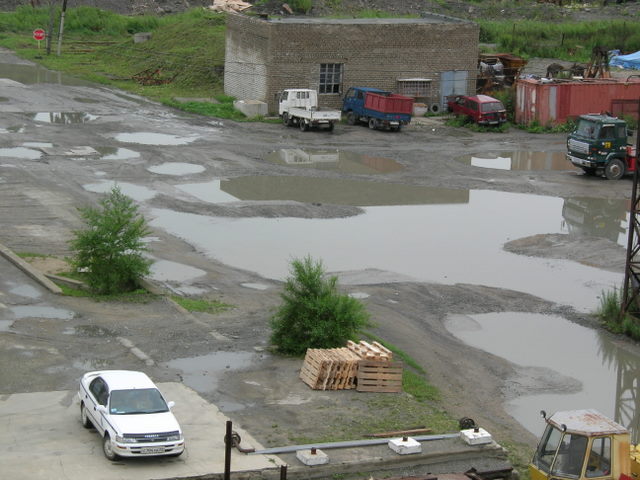
Russian roads were consistent to the last 50 metres.
It would be nice to report that the rain stopped on our last day in Russia; and so it did, but only just. We splashed down to the docks at the appointed 1000 hrs and started the process of figuring how to get ourselves and Elephant out. It became a long day that ended with me sitting on the dock at 1800 hrs on a despondent Elephant while the Russians argued about the correct paperwork to get on the boat. In a way this sums up one element of our Russian experience. There are lots and lots of rules, but no one has the rule book.
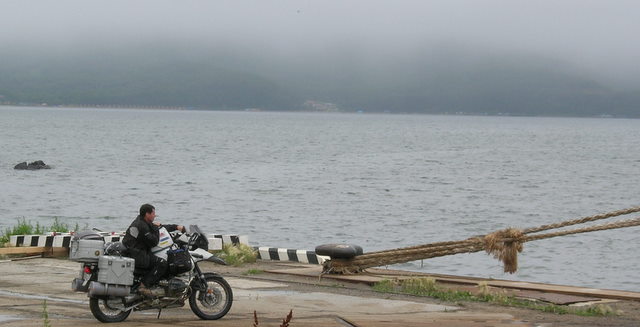
Nothing for Elephant to do but wait. There was no way we would have left Elephant in Russia.
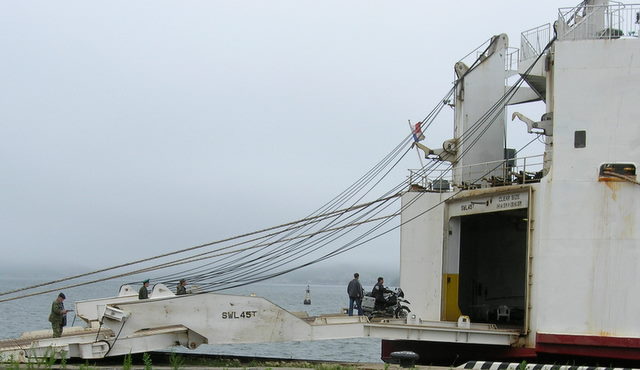
Supervised by three Russian Border Police, I loaded Elephant which was the only vehicle on the vehicle deck.
Eventually, at 2230 hr, the ferry slipped her mooring and it was da svi da niya Russia. The next morning we landed in Sockcho, Korea, and started to come to grips with another type of bureaucracy. The Koreans, it seems, also have lots of rules, but everyone has a copy of the same rule book. We were quickly gripped up by Korean Customs and in a few hours we had been separated from about 600 Greenbacks, given an envelope full of paperwork, escorted to the gate and wished welcome to Korea.
With the rain thundering down we spent the first three nights in Korea in the coastal port of Sokcho. This gave us a chance to start to come to grips with this interesting country and to dry out our riding gear. We launched our culinary exploration at once at the "raw fish market" with a great dinner shared with Bjorn Heggelund a Norwegian we had met on the ferry. Over the next few days we ate our fish in a spicy hot pot and on a traditional bar-b-que. All good! After three nights, however, we grew bored with waiting and decided to ride south in the rain. Rigged for wet-running we splashed down the coastal road towards the industrial heartland.
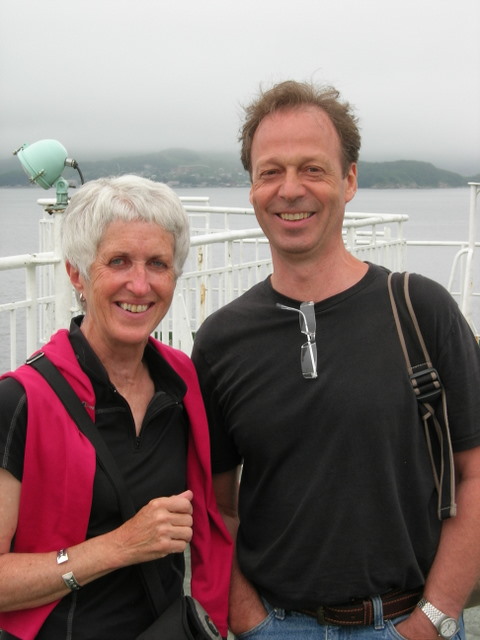
We met Bjorn Hegglund on the ferry. He is a Norwegian who teaches music in Chicago and has some interesting stories to tell.
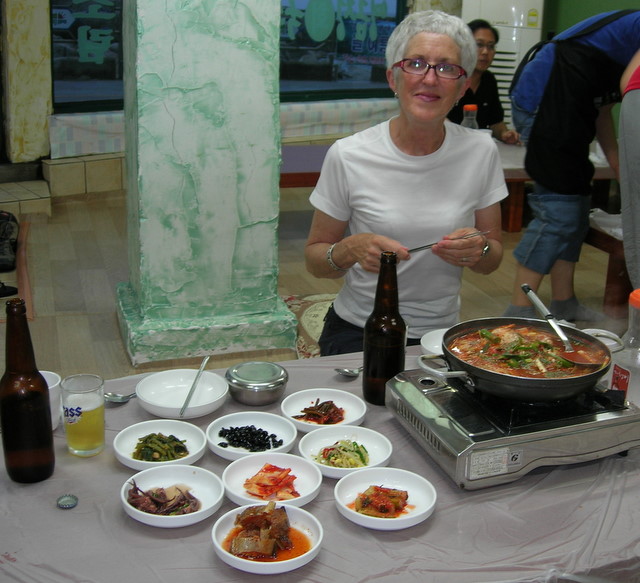
Jo gets set for the fish hot pot. We wasted no time in getting our bellies around some great Korean tucker.
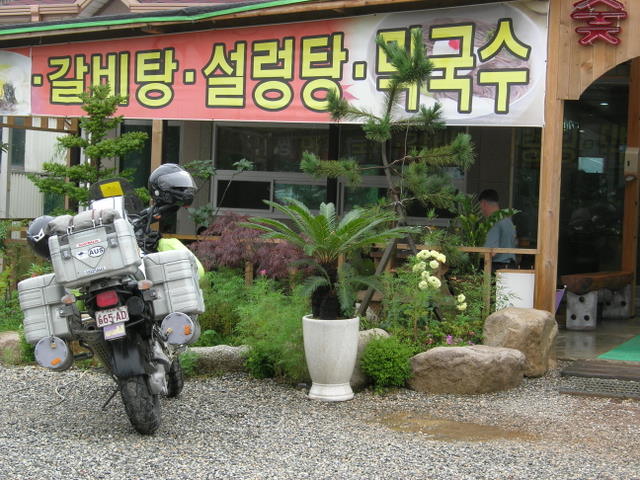
Elephant didn't do so well on Korean fuel. The "standard" is among the worst we have used.
Over the next week we put up with the summer monsoon and rode around the country on two tanks of fuel. It is not a very big place. In addition, 70% of the land is mountainous and the population of 48 million uses every bit of flat or arable land for productive purposes. This leads to the interesting combination of heavily populated industrial centres distributed around largely unpopulated wilderness areas. Korea is also spotlessly clean, oppressively well organised and, to our New World eyes, extraordinarily homogeneous.
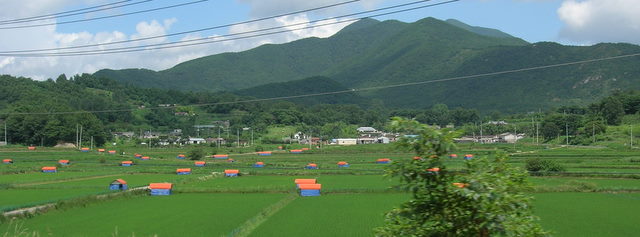
There are lots of picturesque scenes like these rice paddies where every available metre of land is in use.
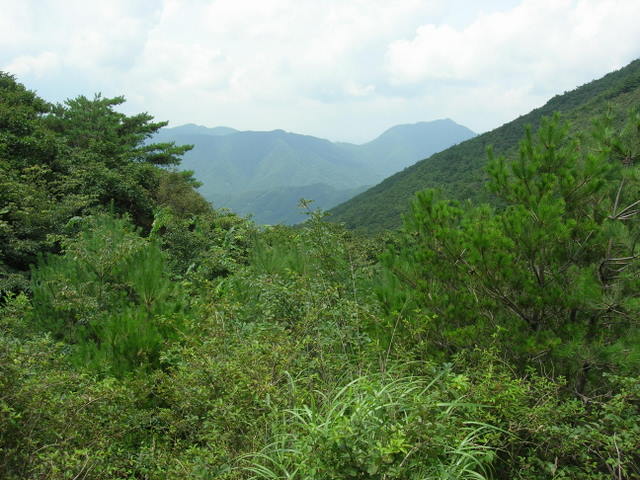
Despite the high population density, there are plenty of wild mountains, people do lots of walking and there are outdoor stores everywhere.
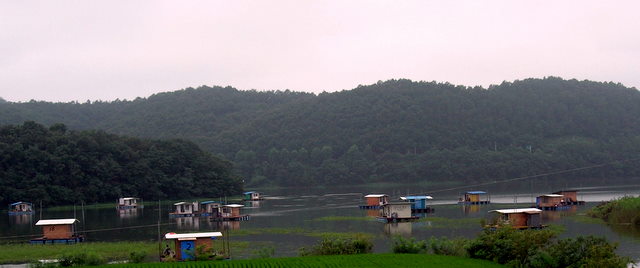
We were taken by these tiny house boats that were used as a platform for fishing in this lake. Koreans fish everywhere.
All of this, plus great food and reasonable prices, makes Korea a treat to visit. But...those of you who have got to know us a little will recognise that we thrive in places that are a little on the shambolic side. Sometimes, organisation is a pain. Take the road system for example. There is an extensive expressway system in Korea criss-crossing the country, but this is of academic interest only to us. Motorcycles are not allowed on the expressways! In case you think this is because of the blistering speed on the super-highways, the maximum is 100 kph. That leaves the A roads. These are as good as motorways in Australia and most other places and much of their length is divided dual carriageway. The speed limited on these roads is generally 60 kph and 80 for short stretches; frustration central.
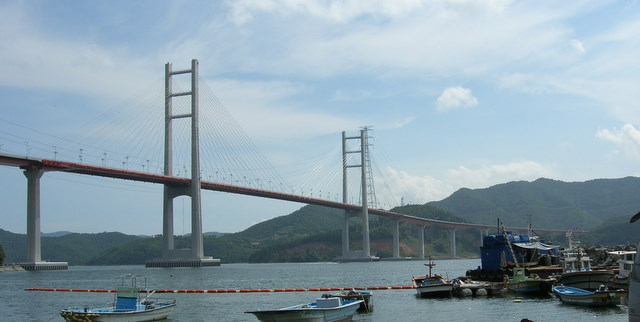
The expressways, like this one, are fantastic but are off limits to bikes despite a ludicrous 100 kph speed restriction.
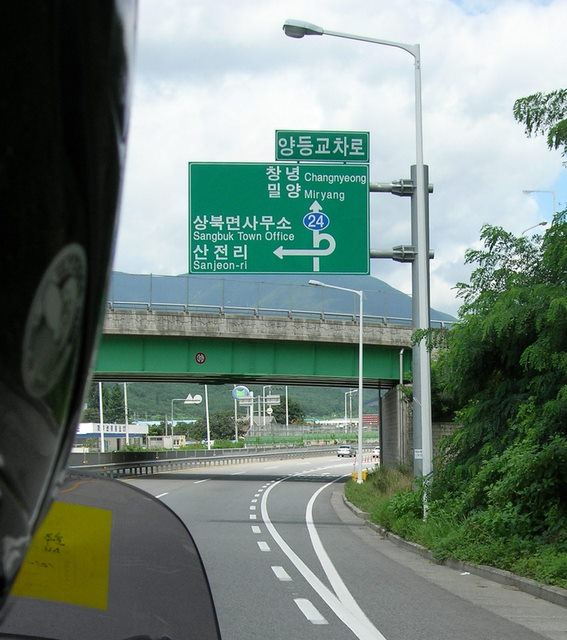
The secondary roads are like motorways elsewhere but are limited to 60 or 80 kph.
We eventually joined a river of traffic flowing north west into the capital Seoul and found our way to the satellite city of Gimpo where we spent a few days cleaning Elephant, repacking and preparing our gear for shipping. There was plenty to do but we also had time to start to become familiar with another huge but amazing city.
No one had much to say on the day we delivered Elephant to the shippers. Not that there was much opportunity to think about events. We still had hours of work to do before we were ready for the farewell. Cleaning off 50,000 km of road grime was the first task. Once that was done, we joined the warehouse staff for lunch before work started on an Elephant crate.
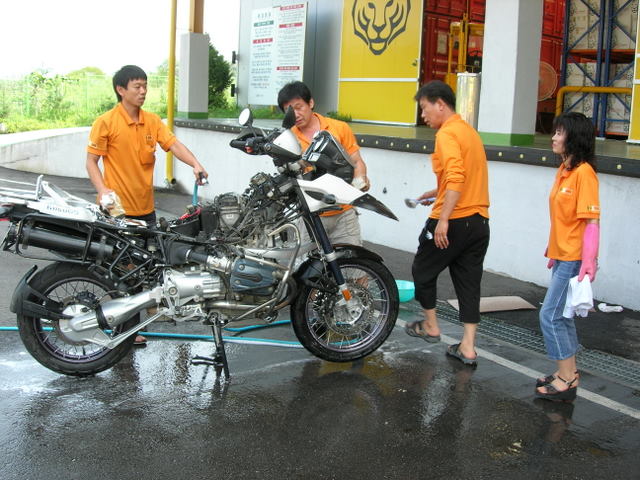
Elephant got as close to a good clean as we could manage without stripping the bike to its component parts.
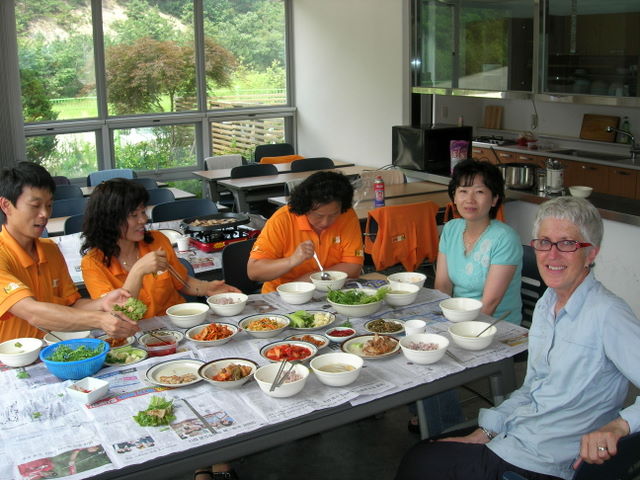
As the depot is a long way from the nearest village, we shared lunch with the workers. Our verdict was that Korean workers are doing OK, thank you very much.
Eventually, with the paperwork and cleaning done, we were ready to load Elephant onto the crate. Jo was inside the office building sorting papers and most of the staff were off on other tasks. I started the engine and, walking alongside, manouvered Elephant in front of the ramp.
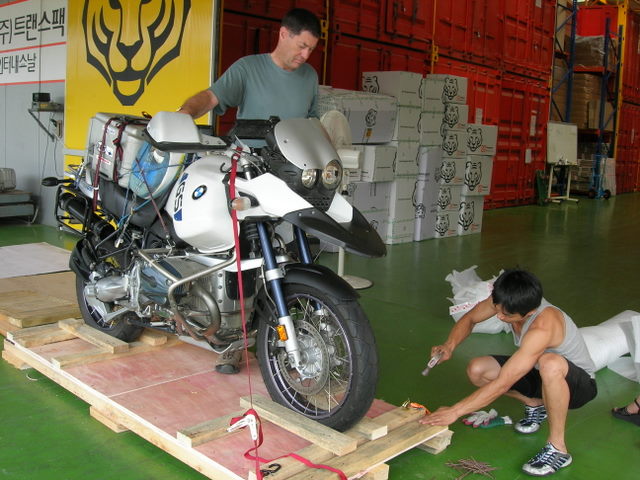
Walking alongside, I drove Elephant the last few metres onto the crate.
I gunned the front wheel up onto the base of the crate. Elephant farted loudly and stalled in disgust. A lone worker stood waiting for the signal to move forward and nail down blocks to stop the wheels moving. The only sound was the faint whine of the fuel pump and the clicking of relays. I reached forward over the dash plate and switched off the ignition. With a final click of relays the panel lights went out and Elephant was silent.
It was 4 August 2008, day 335, and the adventure was over.
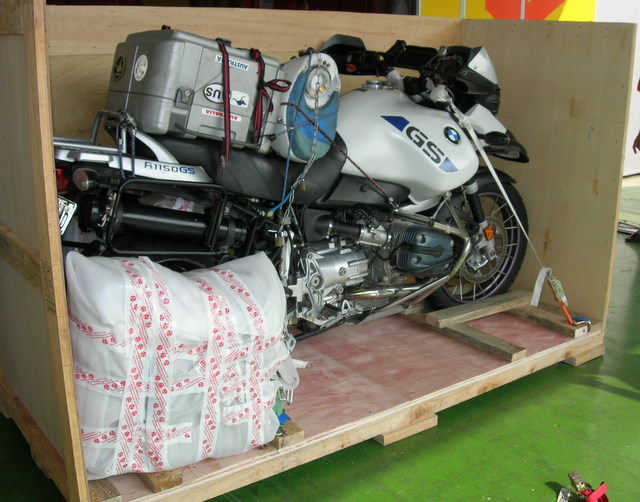
Elephant crated up in Gimpo, Korea, 4 Aug 08.
